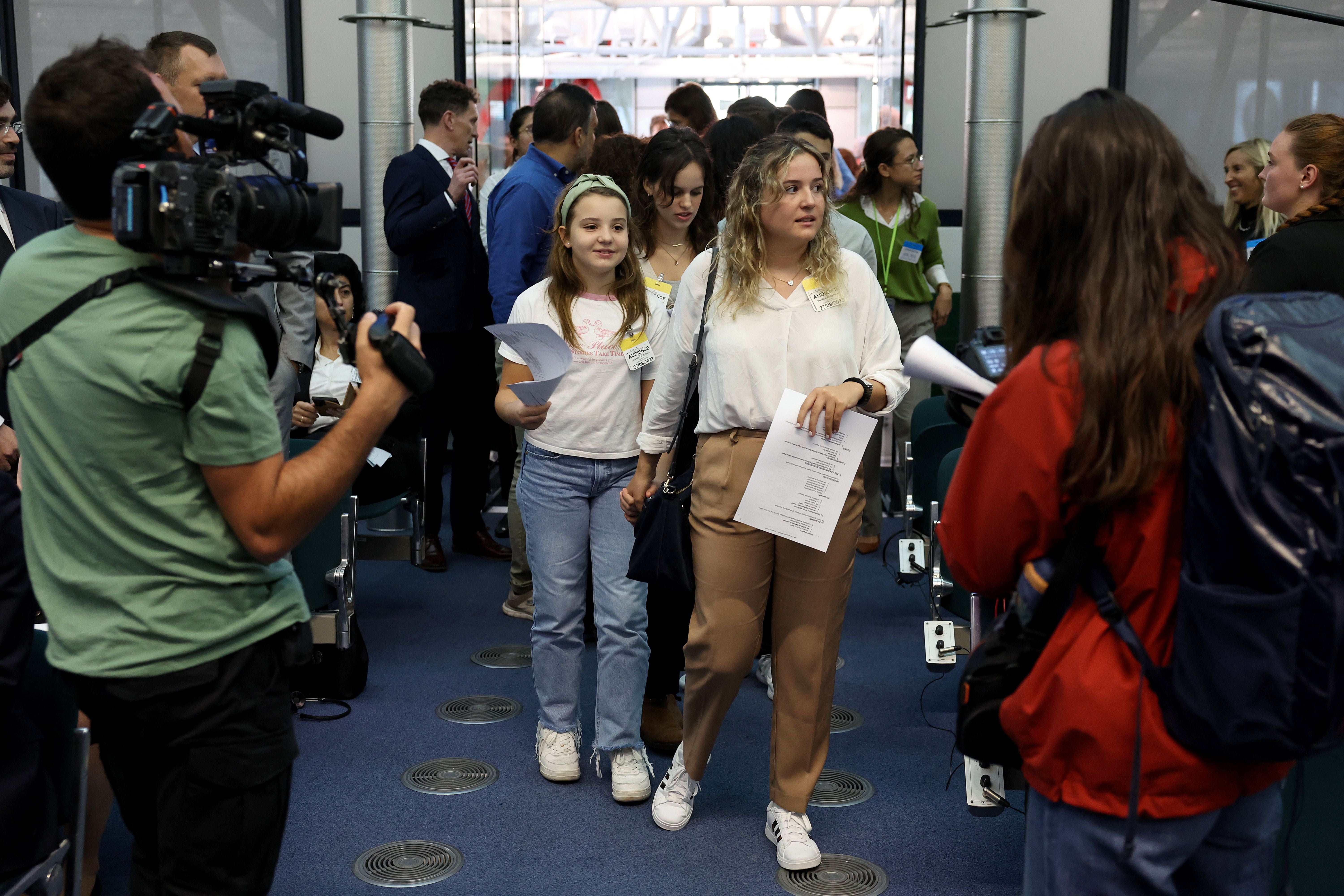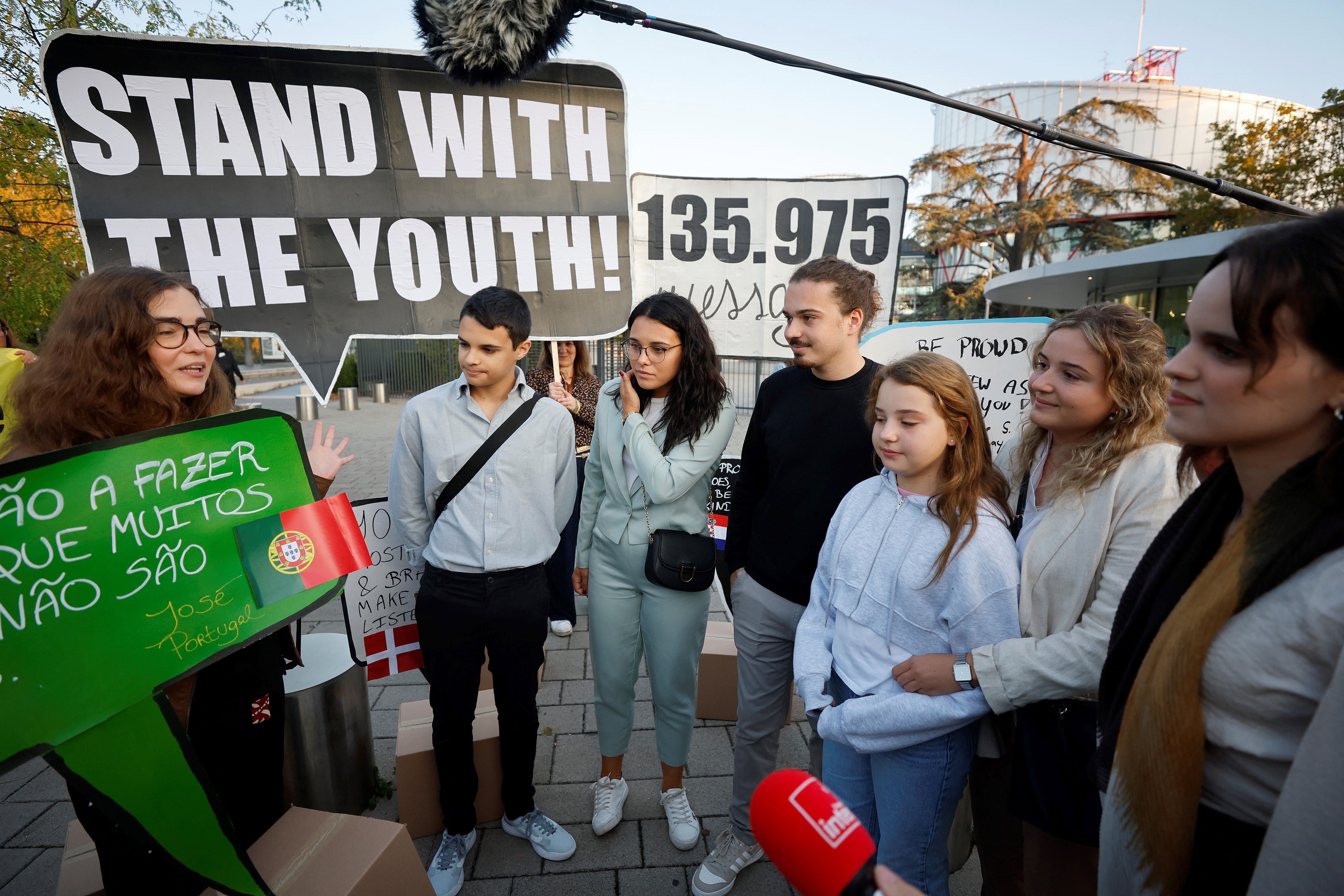Six young people suing 32 countries in ‘unprecedented’ climate action lawsuit
Six lawyers for as many youngsters, some as young as 11, to take on 80 lawyers in ‘David and Goliath’ battle

Six young people from Portugal will soon be taking on 32 European nations in a landmark climate action case that will be heard at the European Court of Human Rights (ECHR).
The hearing on Wednesday will aim to hold governments across Europe responsible for not doing enough to protect people from the negative impacts of the climate crisis.
Lawyers representing the youngsters, some as young as 11, say the continued burning of fossil fuels – responsible for the majority of the pollution that’s heating up the planet – violates their fundamental rights.
The case was filed in September 2020 against 27 EU member states that include the UK, Switzerland, Norway, Russia and Turkey. It is the largest-ever climate case to be heard by the ECHR in Strasbourg.
Gearóid Ó Cuinn, director of the non-profit Global Legal Action Network (GLAN), which has been supporting the group through crowdfunding, described the case as a “David and Goliath” battle of historic proportions.
“It is unprecedented in its scale and its consequences,” he said.
“It also makes legal history. Never before have so many countries had to defend themselves in front of a court, anywhere in the world.”
Of late, there has been a rise in cases aiming to hold governments and corporations responsible for planet-heating pollution, but only some climate cases have been successful at national and regional levels.
A crucial aspect of this case is the legally binding nature of the court’s rulings on member countries, making them accountable for hefty fines if they fail to comply with court directives.
“This judgment would act like a binding treaty imposed by the court on the respondents, requiring them to rapidly accelerate their climate mitigation efforts. In legal terms, it would be a gamechanger,” said Gerry Liston, one of the lawyers from GLAN.
The plaintiffs, aged between 11 and 24, also face a significant hurdle. They must convince the judges that they have been sufficiently impacted to be recognised as victims and that governments are legally obliged to ensure that global heating does not exceed 1.5C above pre-industrial levels, in line with the goals of the landmark 2015 Paris climate agreement.
Various assessments showed the world is currently off course in limiting global heating to 1.5 degrees Celsius, with temperatures projected to rise by 2-4C by 2100 if current emission trajectories persist.
To prove this, the youngsters and their six lawyers will be taking on over 80 lawyers expected to represent the accused countries.
Mr Liston acknowledged “taking on the legal teams of over 30 very well-resourced countries” would not be easy.

Countries have already dismissed their claims. Portugal’s legal team has submitted to the court that it was committed to fight the climate crisis and the applicants had failed to provide evidence of its direct impact on them.
The UK argued for the case to be rejected because it was “inadmissible” for various reasons, including jurisdiction.
In a press conference before the hearing, the young activists shared how the climate crisis has affected their lives, studies and overall well-being.
They expressed concerns about the increasing frequency and severity of extreme weather events, from intense heatwaves to storms and flooding and said they started their judicial action in the wake of a series of deadly wildfires in central Portugal in 2017, where four of them live.
“The climate crisis affects our mental health because it makes us worried about our future. How could we not be scared?” said one of the 15-year-old plaintiffs, André Oliveira.
“It’s 43 degrees (109 F) one day, and the next it’s hail, and that’s dangerous because we can’t predict what’s going to happen,” he said, adding that the heatwave that hit Portugal in May hindered his schoolwork.
“I had exams and I tried to study for them, but it’s hard to concentrate.”
Sofia Oliveira, André’s sister, highlighted the physical toll of the climate crisis, sharing that her brother suffered from asthma due to unusually hot 30C (86F) temperatures in winter.
“Governments around the world have the power to stop this, and Europe’s governments are choosing not to stop this,” said 23-year-old Catarina dos Santos Mota, another member of the group.
“Since we started our action, we have felt the impact of the climate crisis getting worse and worse. In 2023, July was the hottest month on record. It is terrifying to think this is just the beginning.”
A ruling in the case is expected in the first half of 2024.
But whatever comes out of it has the potential to open doors for many more litigations against greenhouse gas emissions.
Two more similar cases, one by an association of senior women against Switzerland and another by a French lawmaker against France, have already been brought before the court since.
Additional reporting by agencies
Join our commenting forum
Join thought-provoking conversations, follow other Independent readers and see their replies
Comments





Bookmark popover
Removed from bookmarks